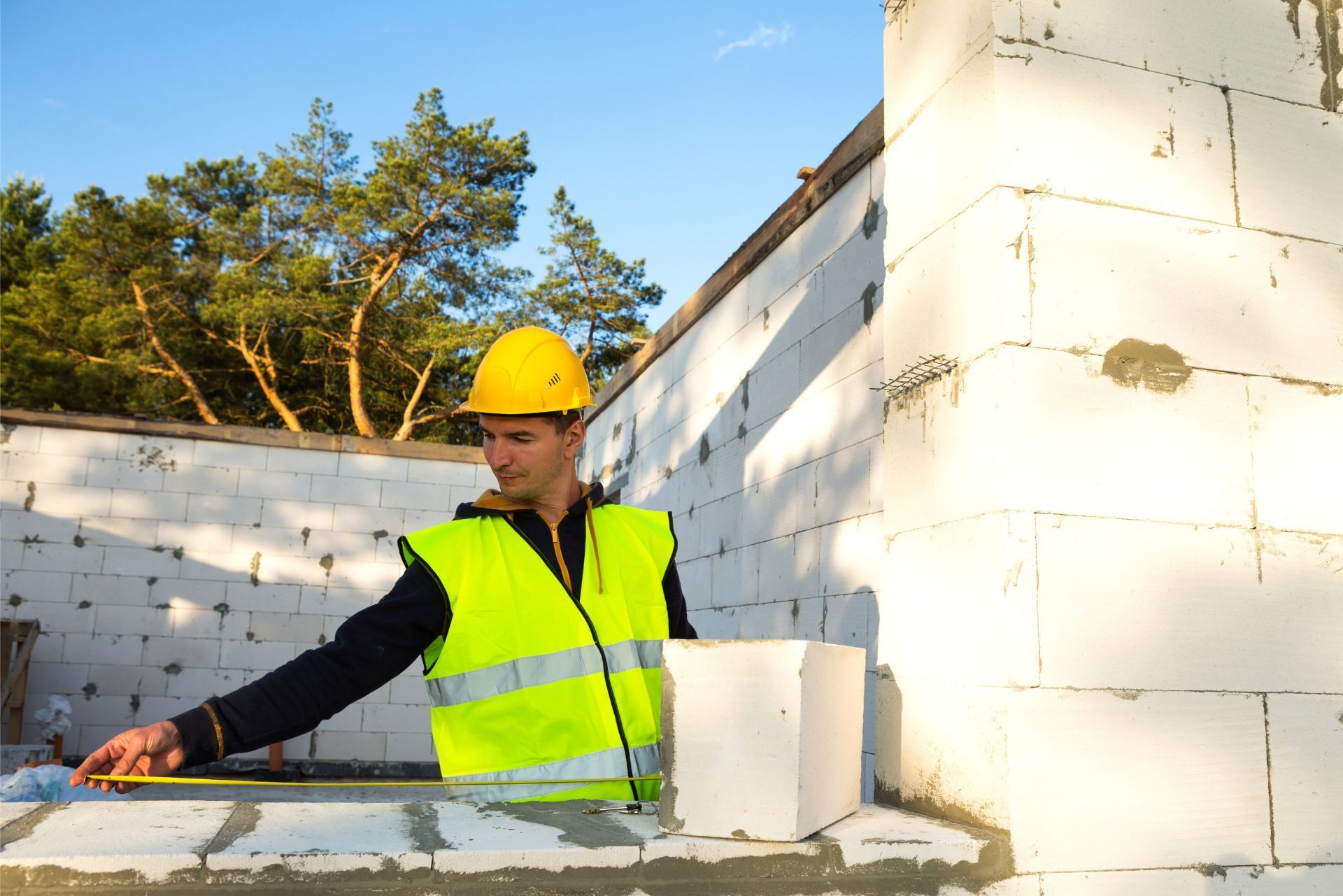Colorado Masonry & Concrete Contractors Insurance

8:30am - 5:00pm Mon-Fri
We'll Reply in 15min*
Index
Understanding the Risks Faced by Masonry & Concrete Contractors in Colorado
Legal Requirements for Contractor Insurance in Colorado
Essential Insurance Coverages for Masonry & Concrete Contractors
Factors Affecting Insurance Costs for Colorado Masonry & Concrete Contractors
How to Choose the Right Insurance Provider in Colorado
Tips for Managing Insurance and Reducing Risks
Contact Us
Phone
303-421-5123
Location
9035 Wadsworth Parkway
Suite 2730B
Westminster, CO 80021
Operating as a masonry or concrete contractor in Colorado comes with unique challenges and risks. From unpredictable mountain weather to complex project demands, protecting your business is essential. One of the most critical steps in safeguarding your livelihood is securing the right insurance coverage tailored specifically for masonry and concrete contractors.
This comprehensive guide covers everything you need to know about insurance for masonry and concrete contractors in Colorado. Whether you’re a seasoned professional or just starting out, understanding the types of insurance available, legal requirements, and best practices will help you mitigate risks and focus on growing your business confidently.
Understanding the Risks Faced by Masonry & Concrete Contractors in Colorado
Masonry and concrete work involves physically demanding tasks that expose contractors to various hazards. From handling heavy materials to working at heights or in extreme weather conditions, the risks are significant and diverse.
Colorado’s unique geography and climate add layers of complexity. Contractors often contend with sudden snowstorms, hail, and temperature swings that can affect both safety and project timelines. Additionally, urban construction sites in cities like Denver and Colorado Springs bring their own challenges, including traffic hazards and strict building codes. The elevation of many Colorado locations also means that contractors must be aware of the effects of altitude on their physical performance and endurance, as well as the potential for altitude sickness, which can impair judgment and reaction times.
According to the U.S. Bureau of Labor Statistics, the construction industry experiences a higher rate of work-related injuries and fatalities compared to many other sectors. For masonry and concrete contractors, common risks include falls, equipment accidents, exposure to silica dust, and structural collapses. These risks translate directly into potential financial losses without proper insurance protection. Furthermore, the financial implications extend beyond immediate medical costs; they can also include lost wages, increased insurance premiums, and potential legal liabilities if safety regulations are not adhered to. Thus, investing in comprehensive safety training and risk management strategies is crucial for contractors aiming to protect their workforce and their bottom line.
Common Hazards in Masonry and Concrete Work
Some of the most frequent hazards that masonry and concrete contractors face include:
- Falls from heights: Working on scaffolding or elevated surfaces increases the risk of serious injury.
- Heavy equipment accidents: Operating mixers, forklifts, and cranes requires vigilance to avoid collisions and crush injuries.
- Exposure to hazardous materials: Silica dust, cement, and other substances can cause respiratory issues and skin irritation.
- Musculoskeletal injuries: Repetitive lifting and awkward postures can lead to chronic pain and disability.
- Weather-related dangers: Ice, snow, and high winds can create unsafe working conditions.
In addition to these hazards, contractors must also be vigilant about the psychological toll that such a demanding profession can take. The pressure to meet deadlines, manage budgets, and ensure client satisfaction can lead to stress and burnout. Mental health is an often-overlooked aspect of safety in the construction industry, yet it is crucial for maintaining a productive and safe work environment. Implementing support systems, such as access to counseling services and promoting a culture of open communication, can significantly enhance the well-being of workers in this high-risk field.
Moreover, the importance of ongoing training and education cannot be overstated. As new technologies and materials emerge, staying updated on best practices and safety protocols is essential. Regular safety meetings, workshops, and certifications can empower contractors and their teams to recognize hazards before they become incidents. By fostering a proactive approach to safety, masonry and concrete contractors can not only protect their workers but also enhance their reputation and competitiveness in the industry.

Legal Requirements for Contractor Insurance in Colorado
Before diving into the types of insurance coverage, it’s important to understand the legal landscape in Colorado. While insurance requirements can vary depending on the project, client, and municipality, certain coverages are typically mandatory or strongly recommended. Understanding these requirements not only helps protect your business but also builds trust with clients who expect compliance with local laws.
General Liability Insurance
Colorado does not mandate general liability insurance for all contractors by law, but it is often required by clients and subcontractors. General liability insurance protects your business from claims of bodily injury, property damage, or personal injury caused by your operations. Without it, a single accident could jeopardize your financial stability. Additionally, having this coverage can enhance your reputation, as many clients view it as a sign of professionalism and responsibility. In competitive bidding situations, being able to demonstrate that you carry general liability insurance can give you an edge over other contractors who do not.
Workers’ Compensation Insurance
Colorado law requires most employers with one or more employees to carry workers’ compensation insurance. This coverage provides medical benefits and wage replacement to employees injured on the job. For masonry and concrete contractors, this is crucial due to the high-risk nature of the work. The construction industry sees a significant number of workplace injuries, and having workers’ compensation insurance not only protects your employees but also shields your business from potential lawsuits. It is important to regularly review your policy to ensure it meets the evolving needs of your workforce, especially as project scopes and employee counts fluctuate.
Independent contractors without employees are generally exempt, but it’s wise to consult with legal counsel to determine your specific obligations. Even if not legally required, some contractors choose to carry this insurance for their own peace of mind, as it can cover medical expenses and lost wages in case of an accident, fostering a safer work environment.
Commercial Auto Insurance
If your business uses vehicles for transporting materials, equipment, or personnel, Colorado law requires commercial auto insurance. This coverage protects against liability and physical damage involving business vehicles. In addition to legal compliance, commercial auto insurance can also cover the costs associated with vehicle repairs, medical expenses from accidents, and even legal fees if you are sued following an incident. Given the unpredictable nature of driving in construction zones, this insurance is not just a legal requirement but a critical component of your overall risk management strategy.
Surety Bonds
While not insurance, surety bonds are often required for public projects or large contracts. They guarantee contract completion and financial responsibility. Many clients in Colorado’s construction industry expect contractors to be bonded as a sign of credibility. The bonding process involves a thorough evaluation of your business's financial health and operational history, which can also serve as a valuable self-assessment tool. Additionally, being bonded can open doors to larger projects, as many public agencies and private clients will only consider contractors who can demonstrate their ability to fulfill contractual obligations through bonding.
Essential Insurance Coverages for Masonry & Concrete Contractors
Beyond legal requirements, several types of insurance are vital for protecting masonry and concrete contractors from the wide range of risks they face.
General Liability Insurance
This is the cornerstone of any contractor’s insurance portfolio. It covers third-party claims for bodily injury, property damage, and legal defense costs. For example, if a passerby is injured by falling debris from your job site, general liability insurance helps cover medical expenses and potential lawsuits.
Typical coverage limits range from $1 million to $2 million per occurrence, with higher limits available for larger projects. Additionally, many clients may require proof of general liability insurance before awarding contracts, making it not only a protective measure but also a competitive advantage in securing jobs.
Workers’ Compensation Insurance
Given the physically demanding and hazardous nature of masonry and concrete work, workers’ compensation insurance is indispensable. It covers medical treatment, rehabilitation, and lost wages for employees injured while working. It also protects employers from lawsuits related to workplace injuries.
Moreover, maintaining workers’ compensation insurance can foster a safer work environment, as it encourages contractors to implement safety protocols and training programs. This not only minimizes the risk of accidents but also enhances employee morale and productivity, knowing that they are protected in case of an incident.
Commercial Property Insurance
This coverage protects your business property, including tools, equipment, and materials, against risks like fire, theft, vandalism, and natural disasters. For contractors who store expensive mixers, scaffolding, or vehicles on-site or at a yard, this insurance is essential.
In addition to covering physical assets, commercial property insurance can also include business interruption coverage, which compensates for lost income during periods when your operations are halted due to a covered event. This aspect is particularly crucial for masonry and concrete contractors, whose projects may be delayed by unforeseen circumstances, impacting cash flow significantly.
Commercial Auto Insurance
Business vehicles face unique risks, especially when transporting heavy materials or navigating construction zones. Commercial auto insurance covers liability and physical damage for vehicles used in your operations, including trucks, vans, and trailers.
Furthermore, this insurance can extend to cover specialized equipment attached to vehicles, such as cranes or concrete pumps, ensuring that your investment is safeguarded against accidents or damages that could occur during transit or on-site operations. This comprehensive coverage is vital for maintaining the operational integrity of your business.
Inland Marine Insurance
Inland marine insurance covers tools and equipment while in transit or at temporary job sites. Since masonry and concrete contractors often move expensive gear between locations, this coverage protects against loss or damage during transport.
Additionally, this type of insurance can provide coverage for rented equipment, which is often necessary for specific projects. As many contractors rely on specialized tools that may not be part of their regular inventory, having inland marine insurance ensures that they are not financially burdened by the loss or damage of rented items, allowing them to focus on delivering quality work without worry.
Pollution Liability Insurance
Concrete production and masonry work can sometimes involve pollutants or hazardous materials. Pollution liability insurance covers claims related to environmental damage caused by your operations, such as accidental chemical spills or dust emissions.
This coverage is increasingly important as regulatory scrutiny on environmental impacts grows. Contractors who can demonstrate proactive measures to mitigate environmental risks, including pollution liability insurance, may find themselves more favorable in the eyes of clients and regulatory bodies, enhancing their reputation and marketability in a competitive industry.
Professional Liability Insurance
Also known as errors and omissions insurance, this coverage protects contractors against claims arising from design errors, project delays, or other professional mistakes. While more common among architects and engineers, some masonry contractors working on design-build projects may benefit from this coverage.
As the construction landscape evolves, the lines between trades are increasingly blurred, with masonry contractors often taking on more design responsibilities. Having professional liability insurance not only protects against potential claims but also instills confidence in clients, as they can trust that their contractor is prepared for any challenges that may arise during the project lifecycle.
Factors Affecting Insurance Costs for Colorado Masonry & Concrete Contractors
Insurance premiums for masonry and concrete contractors vary widely based on several factors. Understanding these can help contractors manage costs while ensuring adequate coverage.
Business Size and Revenue
Larger businesses with higher revenues typically pay more for insurance because they have greater exposure. A contractor with multiple crews and large projects will face higher premiums than a sole proprietor working on small residential jobs.
Claims History
Contractors with a history of frequent or severe insurance claims may face higher premiums. Maintaining a clean claims record by prioritizing safety and risk management can help reduce costs.
Type of Work and Project Scope
Specialized work such as structural concrete, decorative masonry, or large commercial projects can carry different risk profiles. Insurance companies assess the complexity and hazards of the work when setting rates.
Location and Job Sites
Working in urban areas with heavy traffic or in remote mountain locations can influence premiums. Weather risks, site accessibility, and local regulations all play a role.
Coverage Limits and Deductibles
Higher coverage limits and lower deductibles increase premium costs. Contractors must balance adequate protection with affordability.

How to Choose the Right Insurance Provider in Colorado
Selecting the right insurance provider is as important as choosing the right coverage. Colorado masonry and concrete contractors should look for insurers with experience in the construction industry and a strong local presence.
Industry Expertise
Insurance companies that specialize in construction or contractor insurance understand the unique risks and can tailor policies accordingly. They also provide valuable risk management resources and claims support.
Financial Strength and Reputation
Choose insurers with strong financial ratings from agencies like A.M. Best or Standard & Poor’s. A financially stable insurer is more likely to pay claims promptly and reliably.
Customer Service and Claims Handling
Responsive customer service and efficient claims processing are crucial, especially when facing job site incidents. Reading reviews and asking for referrals can help identify trustworthy providers.
Competitive Pricing and Flexible Policies
While cost is important, it should not be the sole factor. Look for insurers offering flexible policy options that can grow with your business and provide comprehensive coverage.
Tips for Managing Insurance and Reducing Risks
Insurance is a vital safety net, but proactive risk management can reduce incidents and lower premiums over time.
Implement Robust Safety Programs
Regular safety training, use of personal protective equipment (PPE), and adherence to OSHA standards can prevent accidents. Colorado contractors should stay updated on state-specific safety regulations.
Maintain Accurate Records
Documenting safety meetings, equipment maintenance, and incident reports helps demonstrate your commitment to risk management and can support claims if needed.
Work with Experienced Insurance Agents
Insurance agents familiar with Colorado’s construction industry can help identify coverage gaps and recommend cost-saving measures.
Review and Update Policies Annually
As your business grows or changes, your insurance needs will evolve. Regular policy reviews ensure you maintain appropriate coverage without paying for unnecessary extras.
Conclusion
For masonry and concrete contractors in Colorado, insurance is not just a regulatory formality—it’s a critical component of business sustainability and success. Understanding the unique risks of the trade, complying with legal requirements, and securing comprehensive coverage tailored to your operations will protect your business from financial setbacks.
By partnering with knowledgeable insurance providers and adopting proactive risk management strategies, contractors can focus on delivering quality workmanship and growing their reputation in Colorado’s competitive construction market.
Investing time and resources into the right insurance policies today can save your business from costly surprises tomorrow.




